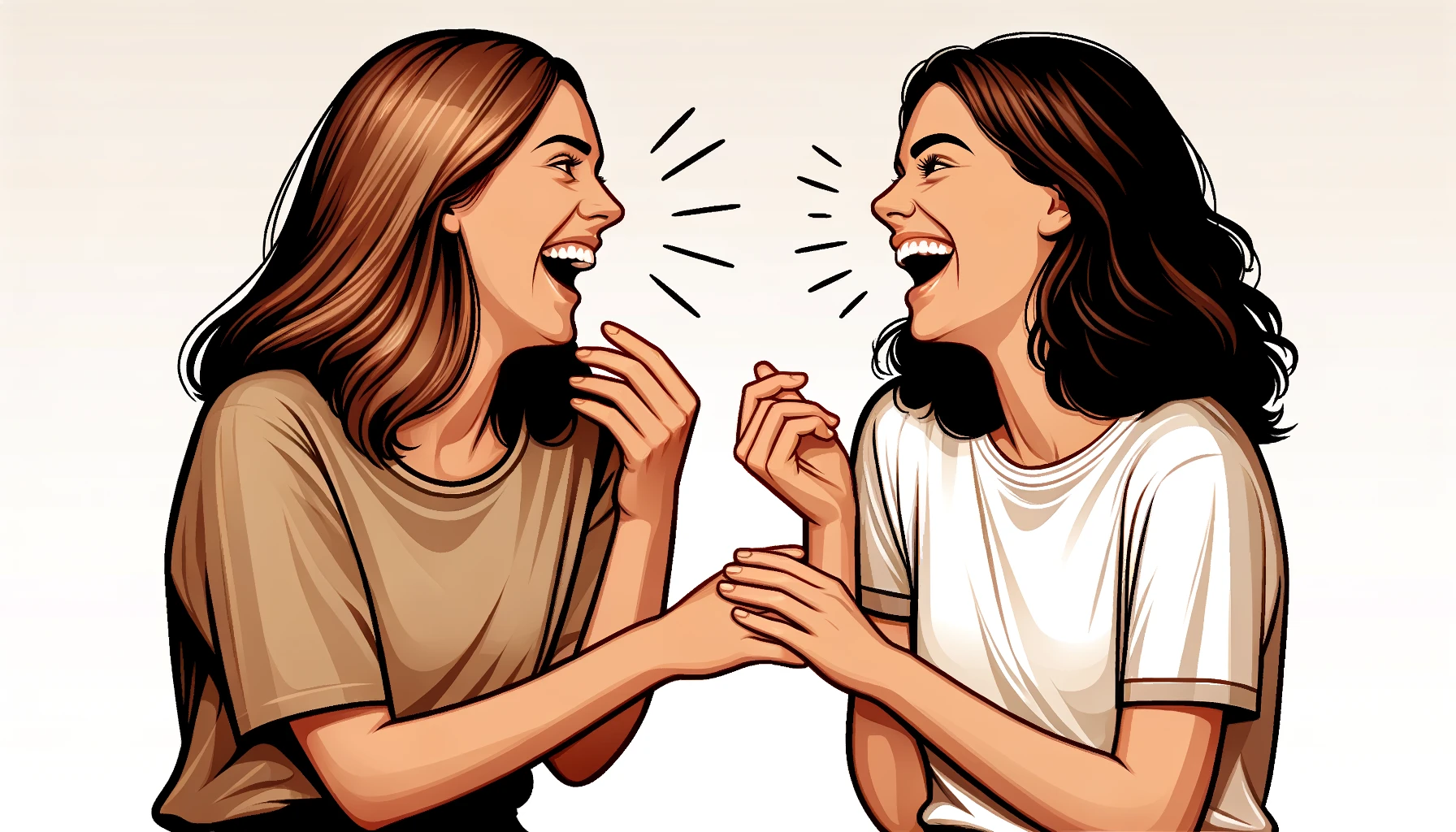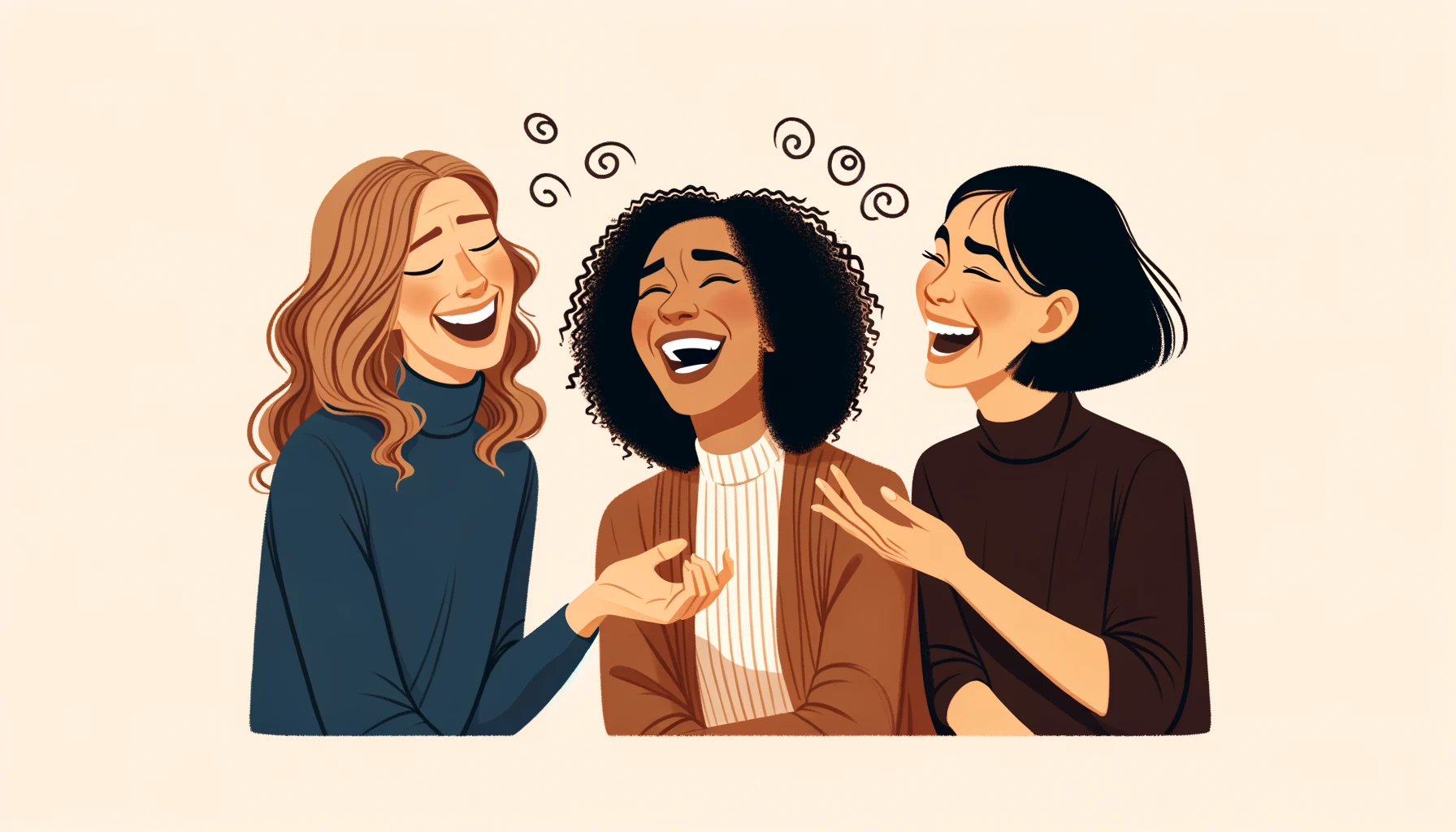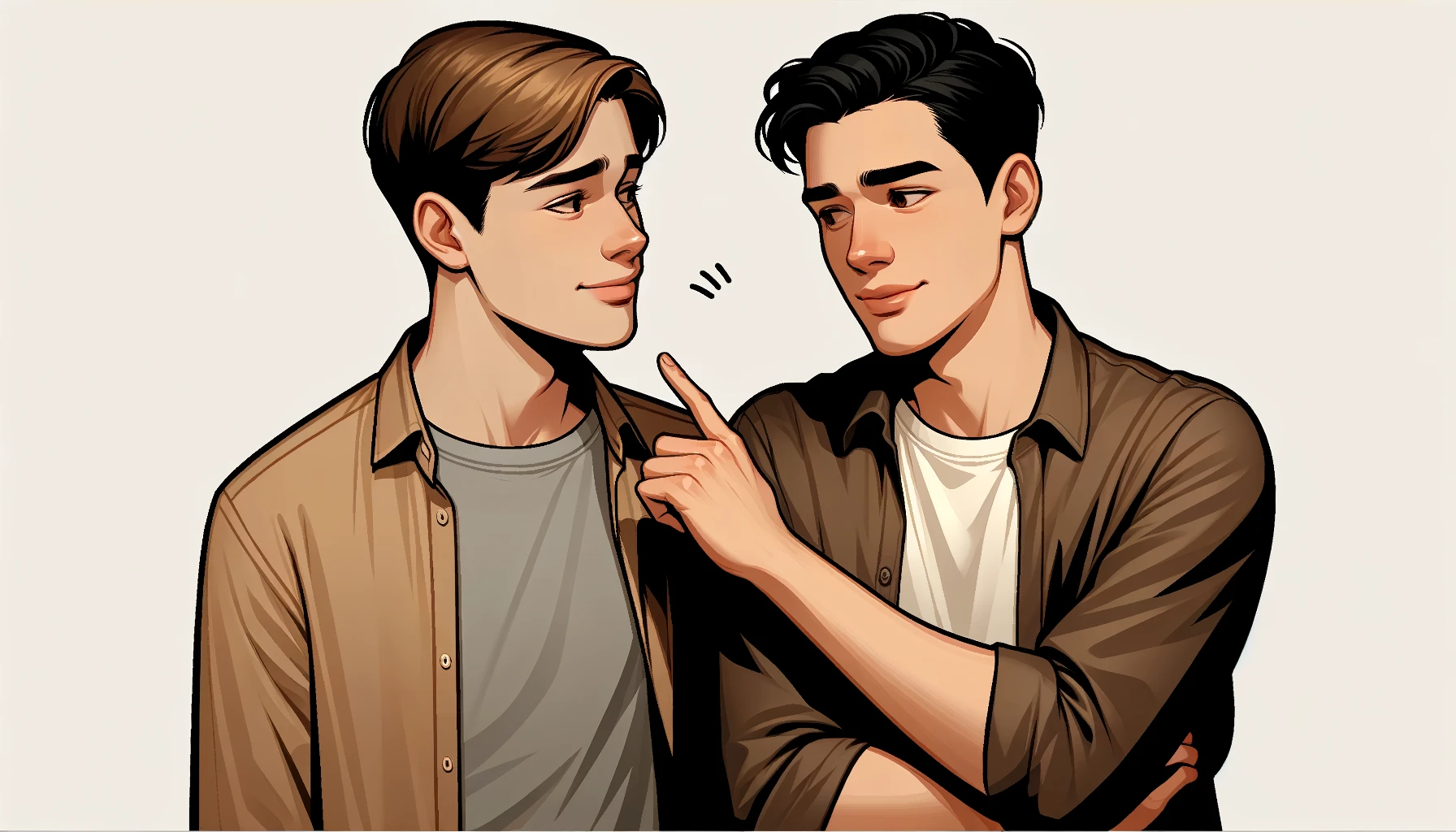Sharing is caring!
Have you ever been hanging out with friends or maybe even just around other people, and someone decides to make a joke about you?
It can feel pretty awkward, right? Sometimes people think they’re being funny, but it might not feel so funny to you.
That’s where having a good comeback can really help. This article is all about giving you some smart and funny responses to use when you find yourself in that spot.
Comebacks are like a secret tool. They can help you stand up for yourself without making a big deal out of it.
Plus, a good comeback can turn the situation around and even make everyone laugh, including you.
It’s not necessarily about being mean back; it’s about showing that you can handle a joke and throw one back too.
In this article, we’ve put together a bunch of comebacks for different kinds of jokes that might be thrown your way.
Whether someone is poking fun at you in a friendly way or if the joke feels a bit mean, you’ll find some great ways to respond.
Good Comebacks For Jokes

1. “Is that your best? My grandma’s jokes hit harder.” – Implies their jokes are weak compared to what you’re used to.
2. “I’d fake a laugh, but I don’t want to boost your ego.” – Suggests you could pretend it’s funny, but don’t want to give them the satisfaction.
3. “Was that supposed to be funny? Maybe try a rehearsal next time.” – Recommends they practice their jokes before sharing them.
4. “Sorry, I only engage in intelligent banter.” – Lets them know their joke wasn’t smart enough for your standards.
5. “Oh, a joke about me? At least someone’s finding you amusing.” – Points out that they might be the only one entertained by their humor.
6. “I missed the joke. Can you repeat it with actual humor this time?” – Asks for a redo, hoping for something genuinely funny.
7. “Your humor’s like a hidden treasure. Too bad no one’s found it yet.” – Implies their sense of humor is nonexistent.
8. “I’d roast you back, but it looks like life beat me to it.” – A playful way to say they’ve already got enough problems without you adding to them.
9. “I’m sure there’s a good joke in there somewhere. Keep looking.” – Encourages them to find the humor that was missing from their attempt.
10. “I’d explain why that’s not funny, but I don’t have the time or the crayons.” – Suggests it would be too difficult to break down the lack of humor to their level of understanding.
11. “Was that a joke or a cry for help? Hard to tell.” – Questions whether their attempt at humor was actually a disguised plea.
12. “Keep talking; someday you’ll say something intelligent.” – Hopes for the day their words will actually make sense.
13. “I’d give you a nasty look, but it seems you’ve got that covered.” – Implies they already appear unpleasant without your help.
14. “I don’t know what your aim was, but I’m sure you missed.” – Points out whatever they were trying to achieve with their joke didn’t land.
15. “Sorry, my humor detector must be broken. I didn’t catch that.” – Claims you didn’t find it funny because your ability to detect humor is “out of order.”
16. “Wow, did you take a class on being this mundane, or is it all natural?” – Wonders if their lackluster humor is innate or learned.
17. “I’d battle you with wits, but I never attack the unarmed.” – Implies they’re lacking in the wit department, so it wouldn’t be a fair fight.
18. “Your joke’s so cold, it could reverse global warming.” – Suggests their attempt at humor was chillingly unfunny.
19. “If humor was water, you’d be a desert.” – Compares their lack of humor to a dry, barren place.
20. “I’m still waiting for the funny part. Did I blink and miss it?” – Indicates their joke was so unfunny, the humorous part was nonexistent.
21. “Was that your attempt at humor? Maybe it’s still loading.” – Implies their joke was a failure, like a page that won’t load.
22. “Oh, joking about me? What an original concept!” – Sarcastically notes that making jokes about you is hardly a new or clever idea.
23. “I thought jokes were supposed to be funny. Did the rules change?” – Questions whether the basic definition of a joke has been altered.
24. “I’d join in on the joke, but I prefer quality entertainment.” – Prefers not to participate in humor that doesn’t meet your standards.
25. “You should put that joke on ice. It needs to cool off from all that burning out.” – Suggests their joke “burned out” from trying too hard to be funny.
26. “Is there a punchline coming, or was that it?” – Awaits a punchline, implying what they said wasn’t enough to be considered a joke.
27. “You must be a comedian in training. Still a lot to learn, I see.” – Playfully notes their failure in making a genuinely funny joke, implying they’re an amateur.
28. “I’d laugh, but I don’t want to encourage your behavior.” – Refuses to laugh as a way to discourage them from making similar jokes in the future.
29. “That joke’s so old, it’s got dust on it.” – Points out the age and staleness of their attempted humor.
30. “Did you borrow that joke from someone, or are you just naturally unoriginal?” – Questions whether their lack of originality in humor is innate or borrowed.
31. “I’d laugh at your joke but I prefer humor with quality.” – This lets them know their attempt at humor fell flat because it wasn’t smart or funny enough for your taste.
32. “Wow, did you take a class on how to be subtly rude, or is it a natural talent?” – Questions whether their rudeness is learned or just part of who they are, highlighting their lack of tact.
33. “Sorry, I only listen to jokes that actually make me laugh.” – Implies that what they said wasn’t funny enough to merit your attention or laughter.
34. “Keep trying; maybe eventually you’ll say something funny.” – Encourages them to keep going as a way to suggest that so far, they haven’t managed to be amusing.
35. “Oh, were you joking? I thought you were just giving a bad opinion.” – Blurs the line between their joke and a poorly formed opinion, suggesting it was too unfunny to recognize as a joke.
36. “If laughter is the best medicine, your jokes must be the illness.” – Uses the old saying about laughter being healing to suggest their jokes are the opposite, actually bringing down the mood.
37. “I’d clap for your joke, but I’m afraid it might encourage you.” – Pretends you considered applauding their attempt at humor but decided against it because you don’t want more of the same.
38. “Is this the part where I pretend to be offended, or do you have a better line?” – Acts as if you’re deciding whether to take their joke seriously, hinting that you expect more creativity from them.
39. “I’m still waiting for the punchline. That was just the setup, right?” – Implies that their joke was incomplete, lacking a funny punchline, and you’re patiently waiting for the actual humor to begin.
40. That joke’s so flat, it needs inflating.” – Implies their joke lacked impact or substance, much like a deflated balloon.
41. “Oh, was that the joke? I was waiting for the funny part.” – Shows you recognized their attempt at humor but found it lacking in actual laughter.
42. “Your sense of humor must be on vacation.” – Suggests their ability to be genuinely funny is absent, as if it took a break.
43. “Guess it’s amateur hour on the comedy scene today.” – Indicates their attempt at humor is unprofessional or inexperienced.
44. “I’d give that joke a rating, but I’m not sure it even qualifies.” – Doubts whether their attempt qualifies as a legitimate joke worthy of rating.
45. “Were you aiming for funny, or is this a new genre of comedy?” – Questions whether their intent was humor or something entirely different, given the lack of laughs.
46. “You’re like a chef who can’t cook; that joke needed seasoning.” – Compares their unseasoned, bland joke to a chef’s dish that lacks flavor.
47. “I think your humor app needs an update; it’s not working.” – Suggests their ability to generate humor is outdated or malfunctioning.
48. “That joke’s so old, I think it’s got fossils.” – Implies the joke is ancient, predating modern humor.
49. “Was that a joke or a puzzle? Because I’m confused.” – Indicates their joke was so perplexing, it felt more like a riddle.
50. “You might want to keep your day job; comedy’s not your forte.” – Advises against pursuing comedy based on their lackluster performance.
51. “If laughs were money, that joke just went bankrupt.” – Suggests their joke failed to generate any ‘currency’ in the form of laughter.
Funny Comebacks For Jokes

52. “I’d say ‘nice try,’ but I believe in honesty.” – Refrains from falsely encouraging their failed attempt at humor.
53. “That joke’s so silent, I could hear a pin drop.” – Compares the lack of laughter their joke produced to complete silence.
54. “You’re recycling jokes now? Environmentally friendly but not very original.” – Accuses them of reusing old jokes, lacking originality despite being “green.”
55. “Should I pretend to laugh now, or do you have more?” – Asks for clarification on whether to feign amusement or brace for additional attempts.
56. “Next time, let’s aim for funny, not whatever that was.” – Encourages aiming for actual humor in future attempts.
57. “Was that the setup, or did I miss the punchline?” – Implies confusion over whether their joke actually reached its climax.
58. “You really swung for the fences, but it looks like you struck out.” – Uses a baseball metaphor to describe their failed attempt at humor.
59. “Is this what passes for humor in your world?” – Questions their perception of what’s considered funny.
60. “I’d critique your joke, but I’m not sure it qualifies as one.” – Hesitates to offer feedback on something that barely resembles a joke.
61. “Your joke’s running on empty; time for a refill.” – Suggests their humor is depleted and in need of rejuvenation.
62. “That joke was a ghost; it completely passed through without notice.” – Indicates their joke was so inconsequential, it went unnoticed.
63. “I’m looking for the humor; give me a map?” – Asks for guidance to find the supposed humor in their remark.
64. “Was that a sneak preview? I’m still waiting for the show to start.” – Treats their attempt as a lackluster teaser for an actual humorous act that has yet to begin.
65. “Your joke’s so weak, it couldn’t lift a feather.” – Suggests their attempt at humor lacks strength or impact.
66. “I think your humor’s stuck in traffic; it hasn’t arrived yet.” – Implies their sense of humor is delayed or stuck somewhere far from the present conversation.
67. “That joke needs a lifeguard; it’s drowning.” – Envisions their failing joke as something in desperate need of rescue.
68. “I’d mail that joke back to sender, but I doubt they’d want it either.” – Suggests even the originator would reject the joke if they could return it.
69. “I’d check your humor warranty; it might be expired.” – Recommends verifying whether their ability to be funny is still valid.
70. “Did you find that joke on sale? Because it sure was cheap.” – Implies their joke was of low quality, like something bought at a discount.
71. “I’m trying to find the funny part, but I think it’s lost.” – Suggests that any humor in their joke is missing or nonexistent.
72. “Was that your attempt at a joke? Maybe keep practicing.” – Encourages them to improve because their current effort wasn’t effective.
73. “I’d laugh, but I don’t want to give you false hope.” – Indicates you don’t want to encourage their unfunny attempts by pretending they were good.
74. “Your joke’s so dry, it needs water.” – Compares their humor to something parched and in desperate need of moisture.
75. “That joke was a swing and a miss. Strike one!” – Uses a baseball analogy to show their attempt at humor failed to hit the mark.
76. “You should add a laugh track; maybe then someone will laugh.” – Suggests their joke needs artificial laughter because it won’t get any real laughs.
77. “Is your humor always this invisible?” – Questions whether their ability to be funny is always this hard to detect.
78. “I’d ask for a refund on that joke.” – Implies the joke was so bad, it wasn’t worth whatever they “paid” for it.
79. “Your joke’s so cold, I think I got frostbite.” – Suggests their attempt at humor was chillingly unfunny.
80. “Was that a preview? I’m still waiting for the real joke.” – Implies what they said was too underwhelming to be the actual humor.
81. “I think your humor got lost in translation.” – Suggests whatever was funny about their joke didn’t come through.
82. “I’d give that joke a participation trophy.” – Indicates the joke was so poor, it only deserves a consolation prize.
83. “That joke needs a GPS; it’s going nowhere.” – Implies their attempt at humor lacks direction and purpose.
84. “Maybe your joke’s just shy and didn’t come out right.” – Suggests their humor failed to manifest as intended, as if it were a living thing.
85. “Your joke’s so weak, I think it needs vitamins.” – Compares their lackluster joke to something frail that requires nutritional support.
86. “I think your joke missed the bus to Funny Town.” – Implies their attempt at humor failed to reach its intended destination of eliciting laughter.
87. “Was that a joke or a riddle? Because I’m puzzled.” – Suggests their joke was so confusing, it felt more like a brainteaser.
88. “That joke just took ‘bland’ to a new level.” – Indicates their attempt at humor was remarkably uninteresting.
89. “You’re recycling jokes now? Think green, but be original.” – Encourages them to be environmentally conscious without reusing old jokes.
90. “Your joke’s so quiet, it’s like it never happened.” – Implies their joke made so little impact, it’s as if it wasn’t told at all.
91. “Was that a joke, or are we playing charades?” – Questions whether their attempt was supposed to be a verbal joke or a mimed act.
92. “I’d rate your joke, but it’s off the scale — the wrong end.” – Suggests their joke is beyond low rating, in a negative space.
93. “Your joke’s so old, it’s collecting pension.” – Implies their attempt at humor is ancient and outdated.
94. “I think your sense of humor took the wrong exit.” – Suggests their ability to be funny veered off course and got lost.
95. “That joke’s so invisible, not even a laugh could see it.” – Implies their joke was so ineffective, laughter couldn’t find it.
96. “I’m sure there’s a joke in there, waiting to be rescued.” – Suggests their attempt contains a hint of humor that’s buried and needs saving.
97. “I’d unpack that joke, but I’m not sure it’s worth the effort.” – Indicates their joke might have deeper meaning, but it’s not enticing enough to explore.
98. “Your joke’s like a shooting star; blinked and I missed it.” – Compares their fleeting attempt at humor to a meteor streaking through the sky, easily overlooked.
99. “I think your joke’s battery is dead; it didn’t start.” – Suggests their joke lacked the energy or spark to elicit laughter, like a car that won’t turn on.
100. “That joke’s so thin, it could slide under a door.” – Suggests their joke was so lacking (in substance or humor) that it’s practically two-dimensional.
Sharing is caring!
